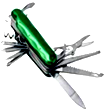问题
选择题
如图所示的下列用品中,通常情况下属于导体的是( )
A.

塑料直尺
B.

陶瓷瓶
C.

钢制刀具
D.

塑料救生圈
答案
A、塑料直尺是塑料制品,所以塑料尺是绝缘体.不符合题意.
B、陶瓷瓶是陶瓷制品,所以陶瓷瓶是陶瓷制品.不符合题意.
C、钢制刀具是金属制品,所以钢制刀具是导体.符合题意.
D、塑料救生圈是塑料制品,所以塑料救生圈是绝缘体.不符合题意.
故选C.
如图所示的下列用品中,通常情况下属于导体的是( )
A.

塑料直尺
B.

陶瓷瓶
C.

钢制刀具
D.

塑料救生圈
A、塑料直尺是塑料制品,所以塑料尺是绝缘体.不符合题意.
B、陶瓷瓶是陶瓷制品,所以陶瓷瓶是陶瓷制品.不符合题意.
C、钢制刀具是金属制品,所以钢制刀具是导体.符合题意.
D、塑料救生圈是塑料制品,所以塑料救生圈是绝缘体.不符合题意.
故选C.